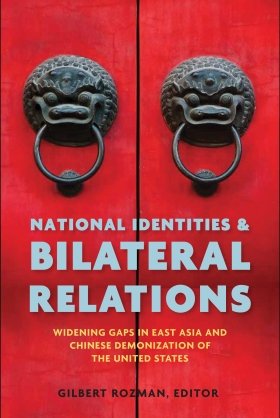National Identities and Bilateral Relations: Widening Gaps in East Asia and Chinese Demonization of the United States

-
The second of Gilbert Rozman’s contributed volumes on East Asian national identity traces how efforts to draw a sharp divide between one country’s identity and that of another shape relations in the post–Cold War era. It examines the two-way relations of Japan, South Korea, and China, introducing the concept of a national identity gap to estimate the degree to which the identities of two countries target each other as negative contrasts. This concept is then applied to China’s reinterpretation from 2009 to 2011 of the gap between its identity and that of the United States. Each pairing represents a key relationship through which an Asian country has historically shaped its identity, and is striving to reshape it.
The volume begins with experts’ analyses of how Japan, South Korea, and China have changed their diplomatic environment in Asia in order to transform identity. In the second half of the book, Rozman reflects on the discomfort all three East Asian countries have from excessive dependence on the United States. He concentrates on Chinese discourse in particular, as analyzed through the ideological, temporal, sectoral, vertical, and horizontal dimensions of national identity. Even if foreign policy turns more cautionary for a time, Rozman argues that China’s inflammatory identity discourse, which remains at an intensity unmatched in the other countries, will continue to have a chilling effect on prospects for pragmatic diplomacy with the United States.
This book, the second of three volumes edited by Gilbert Rozman for Woodrow Wilson Center Press and Stanford University Press, follows East Asian National Identities: Common Roots and Chinese Exceptionalism (2012) and is followed by The Sino-Russian Challenge to the World Order: National Identities, Bilateral Relations, and East versus West in the 2010s (2014).
Gilbert Rozman is the Musgrave Professor of Sociology at Princeton University. He was a Fellow at the Woodrow Wilson Center in 2010–11.
Editor
 Gilbert RozmanEmeritus Musgrave Professor of Sociology, Princeton University; Editor-in-Chief, The Asan ForumBrowse Insights & Analysis
Gilbert RozmanEmeritus Musgrave Professor of Sociology, Princeton University; Editor-in-Chief, The Asan ForumBrowse Insights & AnalysisExplore More
Browse Insights & Analysis
Protests Erupt as South Korean President Faces Backlash Over Martial Law Declaration
Duration:2:44Posted date/time:


